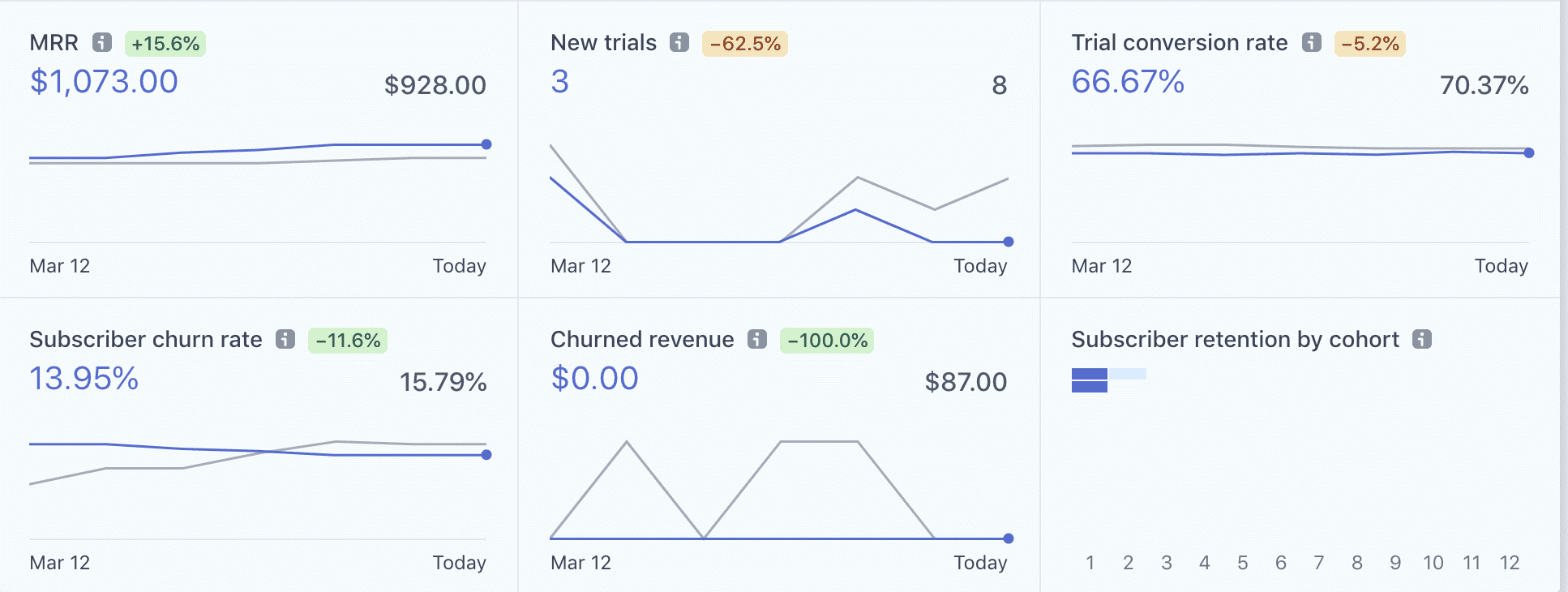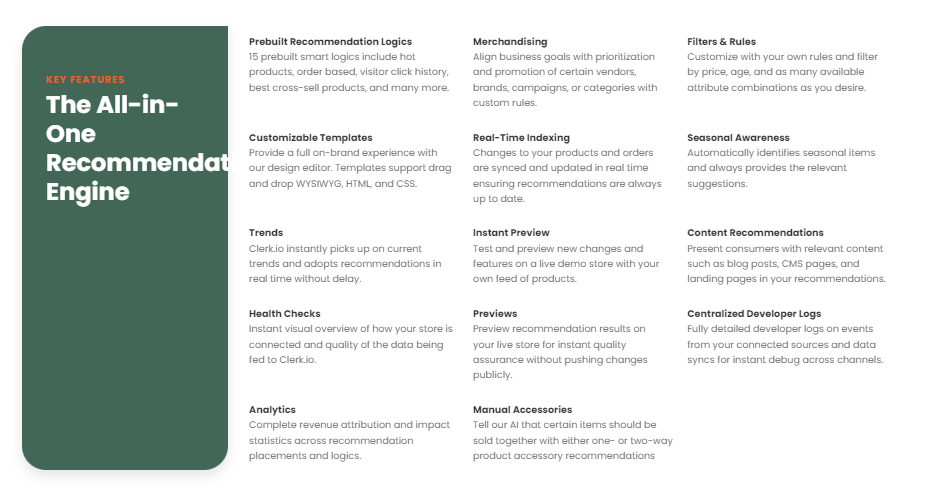9 Best Product Recommendation Engines to Boost Sales in 2024
A product recommendation engine tracks your site visitors’ activities and automatically recommends products they’re probably interested in. This is a powerful marketing mechanism because it is designed to offer each customer a unique, personalized experience.
Over the years, personalization has become the new anthem in the world of marketing. This has become so paramount that 83% of customers are happy to share their data if it leads to improved personalized experiences.
eCommerce giants like Amazon, Target, L’Oreal, and Alibaba leverage the power of product recommendation engines to save marketing costs and generate extra revenue.
If your business has a large team of skilled developers, you can develop your recommender system in-house. But for smaller companies, there are several vendors that offer this solution out of the box.
Today’s guide will reveal 8 of the best product recommendation engines used by the most successful eCom businesses in 2022. You will also learn a few tips to help you make a choice that best suits your business needs.
Let’s proceed.
Before you finally settle on which recommendation engine you would adopt for your business, there are a few things you’d need to do.
First, ensure that your store has a solid backlog of valuable customer information and can generate high-quality data regularly. This will give your recommender system what to work with right off the bat, helping it optimize faster. You could start with a clean slate and scale up on the way. However, it will take more time for your recommendation engine to fully optimize.
Also, it is important to have a data centralization solution to get the best out of your product recommendation system.
Product recommendation strategies usually involve multiple channels, from product pages to emails and social media ads. Each channel generates unique streams of customer data. Manually tracking and analyzing these data streams from their individual sources can be messy and time-consuming, especially for scaling businesses.
However, a good data management system will pull these data streams from their respective sources, consolidate them into one destination, and offer marketers a clean, unified view of their customers’ data. This will help you gauge the efficacy of your recommendation strategy and optimize in record time.
Besides, Improvado can also help you build custom eCommerce dashboards to unify and visualize eCommerce data from over 300+ sources in real-time. Click on the image below to get your eCommerce dashboard template

When it comes to product recommendations, data is key. Without high-quality data, your recommender system will not be able to generate accurate recommendations. Tidying up your marketing data and structuring insights in centralized storage will help you achieve better ROI on your product recommendation activities. Book a call with us to learn more.
There are several product recommendation engines available in 2022. But not all will be suitable for your business. In this section, you will find some important things to keep in mind when choosing your ideal product recommendation engine.
Consider the Number of Product Recommendation Strategies Offered
A good recommendation strategy will ensure that relevant suggestions are served to your site visitors at the right place and time. This will create a favorable experience for the prospects while increasing the chances of generating sales.
🚀Read Guide to Effective Product Recommendation in eCommerce 🚀
Product recommendation engines typically come with a number of strategies out of the box.
Generally, the higher the number of product recommendation strategies, the better.
Pay Attention to the Algorithm
Product recommendation systems rely on various kinds of data filtering algorithms to function. The major ones include content-based filtering, collaborative filtering, and hybrid recommendation.
Modern engines adopt hybrid recommendation because it combines the power of content-based and collaborative filtering systems. Algorithms can determine how fast you generate profit from recommendations, so it is important that you pay attention to them.
Compare Several Engines Using A/B Testing
A/B Testing allows you to compare two product recommendation engines side-by-side to find the one that best suits your needs.
There are several tools you can use for A/B Testing. A few include Google Optimize, VWO, Optimizely, and more.
Ensure That the Engine is Proven in Your Vertical
It is advisable to go for a reco engine that has a case study, demonstrating its impact on ROI and valuable marketing metrics within your vertical. If a product recommendation engine doesn't have use cases or testimonials related to your business type, then it's probably better to look elsewhere.
Consider the Customer Support
Customer support is a valuable aspect of every product. Ideally, you should consider vendors with responsive customer support teams. This will ensure that you can get assisted any time you run into issues and jump back on track as soon as possible.
There are several product recommendation systems sprawled all over the internet. Each of these has a set of characteristics that set them apart. This section will take a look at 8 of the most popular ones in the industry.
To give you a quick overview, here’s a TLDR run-down of the best product recommendation engines:
- Involve.me
- Clerk.io
- Emarsys
- Nosto
- Qubit
- Retail Rocket
- Dynamic Yield
- Criteo
- AdRoll
With that being said, let’s take a look at these engines in more detail.
1. Involve.me
involve.me is a no-code builder that allows you to create a wide range of surveys, forms, calculators, and product recommendation quizzes without writing a single line of code.
With this no-code builder, you can easily create embeddable quizzes to personalize product recommendations, helping your customers find exactly what suits them best.
Furthermore, involve.me seamlessly integrates with CRMs, e-commerce platforms, and email marketing tools, ensuring smooth data transfer between the tools your team uses. In addition to providing recommendations, you can also sell your products or services directly within involve.me's product recommendation quizzes.
The analytics dashboard offers essential key metrics, including responses, payments, completion rate, email open rate, response summaries, and more.
2. Clerk.io
Clerk.io currently serves over 18,000 websites, helping businesses provide personalized experiences for their customers across emails, social media ads, site search, and more.
Its recommendation engine comes with 15 prebuilt recommendation logics, including hot products, customer order history, best cross-sell products, and more.
The system is also built to automatically adapt and change recommendations based on emerging trends and seasons. Furthermore, it gives you access to custom filters to help you tailor your recommendations according to your business needs.
3. Emarsys
Emarsys is an omnichannel customer engagement platform currently used by 15,000 websites across different industries, with eCommerce representing 6% of its user base.
Its recommendation engine leverages offline and online customer data for real-time personalization and product recommendations on different channels and devices.
Emarsys allows users to implement product recommendations in emails, product listings, searches, shopping carts, product descriptions, and ads.
4. Nosto
Nosto’s product recommendation engine utilizes machine learning algorithms to analyze consumers' offline and online behavioral data to serve products relevant to them.
It allows its users access to multiple customization options to help them deploy and adjust personalized recommendations at every aspect of the customers’ shopping journey.
The system also comes with a variety of recommendation algorithms such as best sellers, trending products, new inventory, and more that can be further customized to suit each customer using its Segmentation product.
Furthermore, its A/B Testing and optimizing functionality allow users to test different recommendation strategies and learn insights to help them scale faster.
5. Qubit
Qubit describes itself as the world’s first customer-to-product recommendation engine to use deep learning technology. Its deep learning technology is powered by Google Cloud AI. Thus, it uses the same recommendation technology that serves both Google and YouTube.
Qubit automatically adjusts its recommendation strategy in real-time according to changes that occur at every step of the customer journey. Its automated health check helps users troubleshoot issues, like missing data points and missing products from every data source.
Using deep attribute matching, Qubit allows new products to inherit learnings from older, similar products for more efficient testing in front of customers.
6. Retail Rocket
Retail Rocket leverages Artificial Intelligence (AI) to provide personalization in real-time while providing complex customer segmentation and smart communication strategies for every stage of your sales funnel.
Retail Rocket does not only offer recommendations that are relevant to customers, it also predicts the next possible purchases and prevents sending the same messages to customers via different channels.
Retail Rocket can be implemented in emails, product listings, product descriptions, and shopping carts.
7. Dynamic Yield
Dynamic Yield uses deep learning algorithms, merchandising control, statistical engines, and cross-channel support to recommend relevant products to customers and predict their next purchases.
Dynamic Yield’s recommendation engine, AdaptML, has an impressive segmentation functionality that allows you to implement the right recommendation strategy based on the prospect's position in the sales funnel (home page, product description page, check out, etc.) It also allows you to implement the appropriate strategy based on user attributes, e.g., new user versus repeat customer.
Furthermore, Dynamic Yield enables you to fuse multiple recommendation strategies into one widget or permit the machine learning engine to automatically find the best mix of strategies for you.
8. Criteo
Criteo uses a combination of Artificial Intelligence and commerce data to help businesses create personalized online display advertising experiences for prospects. It partners with several ad networks, including Facebook, Google, Taboola, among others.
Criteo’s strongest selling point is in its retargeting capabilities. Its Dynamic Retargeting functionality enables users to re-engage their site visitors at different stages of their sales funnel with recommendations that are most likely to convert.
9. AdRoll
AdRoll is an eCommerce marketing platform that helps businesses provide personalized product recommendations to customers across multiple channels like websites, emails, and social media platforms.
Just like Criteo, it has an impressive retargeting functionality to help retailers communicate better with their prospects through display advertising.
Product Recommendation Engines Comparison Table
To summarize this section, we’ve included a comparison table showing each recommendation engine along with its functionalities. Please find it below:
By incorporating the power of machine learning and AI into eCommerce, product recommendation engines are paving the way for the future of online shopping.
Your ability to offer personalized experiences to your site visitors is crucial for a wide variety of reasons. It will not only help you generate more sales from each customer but will also help you earn their trust and loyalty in the long run.
Ultimately, I hope that this list has given you the needed insight into some of the best product recommendation engines most successful retailers are using in 2022. Feel free to do additional research to determine the solution that’s best suitable for your business.
500+ data sources under one roof to drive business growth. 👇
.png)
%20(1).png)
.png)

.png)
















%20(1).png)

.png)





.png)


.png)
.png)
